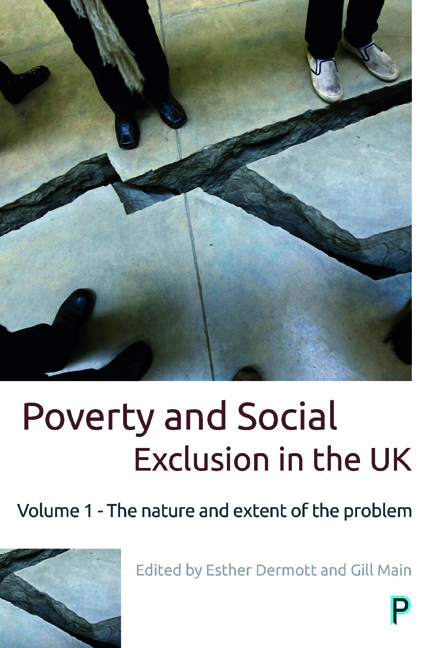Book contents
- Frontmatter
- Dedication
- Contents
- List of tables and figures
- Notes on contributors
- Acknowledgements
- Introduction: poverty and social exclusion in the UK
- One Measuring poverty in the UK
- Two The impoverishment of youth: poverty, deprivation and social exclusion among young adults in the Uk
- Three Improvement for some: poverty and social exclusion among older people and pensioners
- Four Which men and women are poor? Gender, poverty and social exclusion
- Five Better understandings of ethnic variations: ethnicity, poverty and social exclusion
- Six Improving lives? Child poverty and social exclusion
- Seven The cost of children: parents, poverty, and social support
- Eight A worsening picture: poverty and social exclusion and disabled people
- Nine Devolution and North/South division: poverty and social exclusion in the countries and regions of the UK
- Ten More similarities than differences: poverty and social exclusion in rural and urban locations
- Conclusion: innovating methods, informing policy and challenging stigma
- Technical appendix
- Index
Five - Better understandings of ethnic variations: ethnicity, poverty and social exclusion
Published online by Cambridge University Press: 08 April 2022
- Frontmatter
- Dedication
- Contents
- List of tables and figures
- Notes on contributors
- Acknowledgements
- Introduction: poverty and social exclusion in the UK
- One Measuring poverty in the UK
- Two The impoverishment of youth: poverty, deprivation and social exclusion among young adults in the Uk
- Three Improvement for some: poverty and social exclusion among older people and pensioners
- Four Which men and women are poor? Gender, poverty and social exclusion
- Five Better understandings of ethnic variations: ethnicity, poverty and social exclusion
- Six Improving lives? Child poverty and social exclusion
- Seven The cost of children: parents, poverty, and social support
- Eight A worsening picture: poverty and social exclusion and disabled people
- Nine Devolution and North/South division: poverty and social exclusion in the countries and regions of the UK
- Ten More similarities than differences: poverty and social exclusion in rural and urban locations
- Conclusion: innovating methods, informing policy and challenging stigma
- Technical appendix
- Index
Summary
Introduction
A review of the evidence from 350 studies carried out in the UK between 1991 and 2006 revealed that minority ethnic groups are more likely to be living in poverty, regardless of the measure of poverty or deprivation used, with the highest rates among Bangladeshi, Pakistani and Black African groups (Platt, 2007). On most measures, the poverty experienced by Bangladeshi people was found to be more severe and longer lasting than that for any other group examined. But this picture of ethnic disadvantage varies according to the measure used. For example, Pakistanis have been found to be severely disadvantaged on many, but not all, measures. Similarly, around two fifths of Black Caribbean (and Bangladeshi) people – traditionally not among those ethnic groups considered in research as particularly disadvantaged – said that they were either worried about money ‘all the time’ or did not manage ‘very well’ on their incomes, compared with just under a third of Pakistani people and a fifth of people in white and Indian groups (Berthoud, 1997). Black Caribbean people also experienced more debt and debt-related anxiety than might be expected from their income level.
According to the 2011 England and Wales Census, over a third of Bangladeshi and Pakistani people lived in a deprived area, but there were some subtle differences in aspects of that disadvantage (Jivraj and Khan, 2015). Almost half of Bangladeshis lived in areas with a high concentration of low incomes and a third lived in areas experiencing barriers to housing and other services. Meanwhile, those in Pakistani groups were most likely to live in areas with a poor environment, poor education and high unemployment. Black African people, by contrast, were most likely to live in areas affected by high levels of crime (Jivraj and Khan, 2015).
There are also ethnic groups which have traditionally been ignored in poverty studies but have since been identified as experiencing significant disadvantage. For example, the addition of further minority ethnic categories in 2011 England and Wales Census revealed that while those of white ethnicities were in a more advantaged position generally in the labour market than those of other ethnicities, there were considerable differences between white British, white Irish, and white Gypsies and Irish Travellers in this group (Kapadia et al, 2015).
- Type
- Chapter
- Information
- Poverty and Social Exclusion in the UK Vol 1The Nature and Extent of the Problem, pp. 115 - 134Publisher: Bristol University PressPrint publication year: 2017



